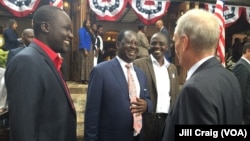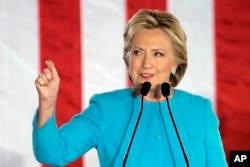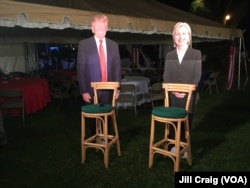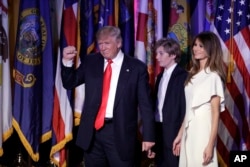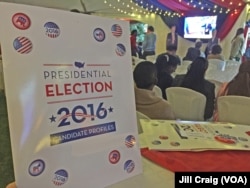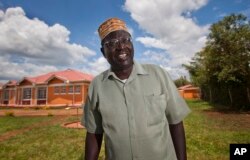Feelings about Donald Trump’s U.S. election win are mixed in Africa.
In Kenya, where President Barack Obama has familial roots, many were hoping Hillary Clinton could carry on his legacy, but were prepared for disappointment.
"Personally, I think it [Trump’s win] was expected because I don't think America was ready for a female president just yet," said Jamila Wafula, a student at Jomo Kenyatta University near Nairobi. "We were really hoping that Clinton would win, but it was expected for Trump to win.”
Sara Asafu-Adjaye, a Ghanaian social activist, says she would have loved to have seen the first female U.S. president.
“Not only is it that she is a woman. She’s a competent woman,” said Asafu-Adjaye. “And the fact that millions, over 48 percent of Americans believe that she’s not the better person for the job, it scares me.”
Charles Eboune, an international relations expert in Cameroon, was dismayed Clinton's decades of experience in Washington was not enough to carry her to victory.
"[If] you look at the caliber of the lady who was in front of him in the election and all those who backed her, it was another translation that [the] majority is not always right,” said Eboune.
Change in style
Now, Africans have to adjust to the fact that a president with a very different style and priorities from both Obama and Clinton is going to take office.
More than a few Africans are worried about the policy changes Trump may implement.
“It might slow down immigration, probably from African countries toward the U.S.," said Francis Kouamé in Ivory Coast. "It is going to make it more difficult. Really, I’m not happy that he won.”
A Congolese newspaper reported the election results as “The Trump Surprise,” while a popular Senegalese website displayed a photo of Trump, with a headline playing on the president-elect’s last name and the French verb se tromper, “to make a mistake.”
But an administrative worker in Dakar tries to remain optimistic about America’s choice of president.
“I am a little disappointed, because I supported Hillary Clinton, but I see that the people of the United States have chosen their president,” said Moussa Traore. “Donald Trump is not bad. The essential is that the people are a little unhappy to hear this, but maybe there will be change.”
Keith Benon Robe was active in Uganda’s opposition during his country’s presidential elections earlier this year. He says he is excited because he believes Trump will stand up to Africa’s dictators.
“I jumped off my feet in celebration. I was so joyous and I'm still, it's just unbelievable,” said Robe. “I'm sure the economy will be better, better than it is right now. And I trust him because he's a businessman; he's going to change everything. But the main point is he's going to help us change this regime, which we're tired of.”
A good example
The fact that Trump was legitimately elected was not lost on some Africans, who have seen many rigged or suspect elections in their time.
Stanley, a history teacher at the Institut Supérieur Pédagogique de la Gombe in Kinshasa who preferred not to give his last name, says that regardless of winner, the American election cycle sets a good example for other countries.
“The lessons which I draw as a Congolese citizen, as an African, is that it’s a handover of power, clear and clean, without problem. Mrs. Clinton has even called Trump to congratulate him,” said Stanley.
African leaders and politicians in Kenya, South Africa, Uganda, Tanzania, Burundi, the Democratic Republic of Congo and Somalia, to name a few, have already sent or tweeted messages to Trump, congratulating him on his victory. Malik Obama, President Obama’s half-brother, has also congratulated Trump.
Thuso Khumalo reported from Johannesburg. Lizabeth Paulat reported from Kampala. William Clowes reported from Kinshasa. Emilie Iob reported from Abidjan. Ricci Shryock reported from Dakar. Moki Edwin Kindzeka reported from Cameroon. Francisca Kakra Forson reported from Accra.




